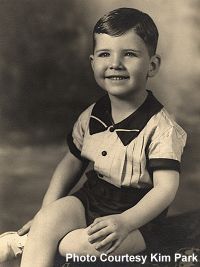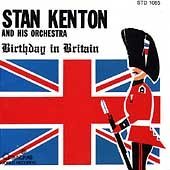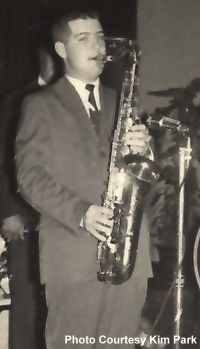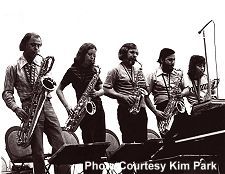 John
Park, was a brilliant genius of improvisation on the saxophone. A
natural talent, he served as a master of music and life, and his
sense of humor made him a fun person to be around. With such a keen
mind and wit, he gave me a holistic sense that life and music were
inseparable in profoundly expressing all the emotions and heartfelt
feelings we have in living life to its fullest. John ultimately
served as lead alto with the Stan Kenton Orchestra. John
Park, was a brilliant genius of improvisation on the saxophone. A
natural talent, he served as a master of music and life, and his
sense of humor made him a fun person to be around. With such a keen
mind and wit, he gave me a holistic sense that life and music were
inseparable in profoundly expressing all the emotions and heartfelt
feelings we have in living life to its fullest. John ultimately
served as lead alto with the Stan Kenton Orchestra.


"Kim's father, the late
John Park, was considered by many to be one of the greatest alto
saxophonists to have played with the band. His solo on "Street of
Dreams" on the Birthday in Britain album will always be remembered."
William H.
Alburty in
JAM Magazine
Fan Reviews:
|
This was a band that I had the pleasure of
hearing shortly before the Britain tour that
year (1973). This is the Kenton band at one of
its finest moments. Though all the tracks are
really good, the "Street of Dreams" track,
featuring John Park on alto is worth the price
of the whole CD. |
|
|
John Park's solo on "Street of Dreams" is an
absolute classic! I've had the pleasure of
hearing him with the band on a couple of
performances and he is one the the best that no
one knows about. If you enjoy listening to the
saxophone, this solo will make you grin ear to
ear! The rest of the CD isn't too bad either! |
|
The John Park Memorial Jazz Saxophone Scholarship at the
University of North Texas
Artist Profile, John Park's daughter:
Suzy Park |

John Park performs on the
Ed Sulivan show.


Kim Park is the son of the late,
great lead alto saxophonist with the Stan Kenton Orchestra, JOHN
PARK, and continues to play his dad's horn.
John Park Tribute Page
My
Father's Spirit
The Heart of John Park
A Tribute to John Park -- Dad & Me
The John Park Collection


The saxophone section of the Stan
Kenton Orchestra. l - r, Roy Reynolds, Mary Fettig, (Kim's future wife),
John Park, Richard Torres and Kim Park.
|
Liner notes written by Jerry Atkins for a John Park LP entitled:
'If Winter Comes . . .' :I caught the Kenton Orchestra once after they returned to the United
States and as expected, John was superb. Stan talked about an album
showcasing John on alto which Willie Maiden had already begun scoring.
Continuing heart difficulties, however, forced John from the road and to
his Houston residence. Needless to say he became a major figure in the
Houston jazz scene starting a lab band program at the University of
Houston, organizing a Monday night rehearsal band and playing dates as
often as possible.
More than once he told me: 'I'm a jazz tenor player who makes a living
as a lead altoist.' Most who knew him thought his real individuality was
on alto, but I think he could equal it on tenor any time. His work with
the Houston Pops Orchestra, the Houston Music Theater and his ability as
a contractor for dozens of notable performers was not exactly an inborn
talent. It came from all his dedicated work at being a complete
musician.
I circulated some of John's early tapes to my Danish friend, Arne Astrup,
who is a highly respected saxophonist in Copenhagen. His enthusiasm for
John's playing equaled by own and he never stopped playing those tapes.
First it was for his fellow musicians and later for Tony Williams, owner
of Spotlite Records in London. When Stan Getz visited Arne, he first
heard John on Tape. It was not until 1979 that John and Stan met in
person and a recording date was later discussed.
After becoming a representative for Yamaha Corporation, John moved to
Dallas in June of that same year. It was my pleasure to go with him to
the Sixth Annual 'Bird Lives Festival' held at the Recovery Room on
September 1. Words can't describe his fiery and inspired playing that
night with new found friends and Dallas musicians; Bill Tillman, Tony
Klatka, Marchal Ivery, Pete Vollmers and a very late arrival -- Red
Garland. Somebody went to South Dallas to get him shortly before
midnight. Red was a bit provoked about being awakened but that changed
when he came into the Club and heard what was happening. I was told
later that the insistent remark 'there's an altoist there you just gotta
hear' was the challenge that got him there. It was all too brief but he
left with a huge smile.
Then came the invitation from Leon Breedan for John to appear as guest
artist at North Texas University's 'One O'clock Jazz Lab Band' Fall
Concert which was a tribute to Stan Kenton who had died just a few
months earlier.
The date was November 20 and somehow I knew that even though this was
taking me from my business, I wanted to be there. I've heard 'Street of
Dreams' a hundred times with several alternate performances, but each
time it's always brought back the realization of how much emotion was
within John. I never knew that chart was often played by Art Pepper
until John explained to the massive audience that there were interesting
little "x's" and "o's" at the bottom of his part. He said he believed
that Art must have put them there as sort of a personal rating system
every time he played his solo. The other three Kenton charts featuring
John that night were all by Bill Holman and came from Stan's
'Contemporary Concepts' album.
I quote from a review of the concert. 'The high point was the choice of
the Holman chart, 'Cherokee,' which survives from the Charlie Parker
tour with the Kenton Orchestra decades ago. John Park was Bird,
Cannonball Adderley, along with a touch of Sonny Stitt. But mostly he
was John Park at his best!'
John's wife, Shirley, his mother and two daughters were there that
night. Don Jacoby said: 'You're unbelievable.' Leon Breedan remarked
'that guy has found some more notes on the saxophone that don't exist.'
Everybody was beaming and happy. I didn't dream it was the last time I
would see John.
It was sometime early the morning of December 7, 1979 when John's heart
stopped. I was crushed. Two studio recording sessions were planned for
early 1980. For a long time I could only think of how sad it was that so
few had known and heard this beautiful person as I did.
As often happens, when these two sessions were casually recorded, nobody
ever thought of a record. I was not present at the 1975 Kansas City Jazz
Festival, John was living in Houston and was invited to that historic
city twice that year. His first performance was so praised that he was
invited back in November. Both times he played with the steady rhythm
section of Salisbury, Abel and Brady and both were sponsored by the
'Friends of Jazz'. The second concert was actually called the 'John Park
Jazz Concert.' We continue to search for a tape of that event.
The second session included here was almost completely spontaneous. It
was a complete surprise to see John late in the afternoon on that
Valentine's Day. He was going to New Orleans but agreed to stay over and
play for an informal gathering of musicians. I made a few phone calls
and it just happened.
Constant encouragement from friends and especially Bill Craig and Gary
Foster has convinced me that this is valid material that should be
shared with the jazz world. There are a few problems but the beauty is
there above everything else. We know you'll hear it and discard the
unimportant imperfections. That's the way jazz should be heard.
These 'If Winter Comes' sessions are a recorded memory of love, joy and
retrospect for those who were not fortunate to have known John.
---- Jerry Atkins |


 John
Park, was a brilliant genius of improvisation on the saxophone. A
natural talent, he served as a master of music and life, and his
sense of humor made him a fun person to be around. With such a keen
mind and wit, he gave me a holistic sense that life and music were
inseparable in profoundly expressing all the emotions and heartfelt
feelings we have in living life to its fullest. John ultimately
served as lead alto with the Stan Kenton Orchestra.
John
Park, was a brilliant genius of improvisation on the saxophone. A
natural talent, he served as a master of music and life, and his
sense of humor made him a fun person to be around. With such a keen
mind and wit, he gave me a holistic sense that life and music were
inseparable in profoundly expressing all the emotions and heartfelt
feelings we have in living life to its fullest. John ultimately
served as lead alto with the Stan Kenton Orchestra.

